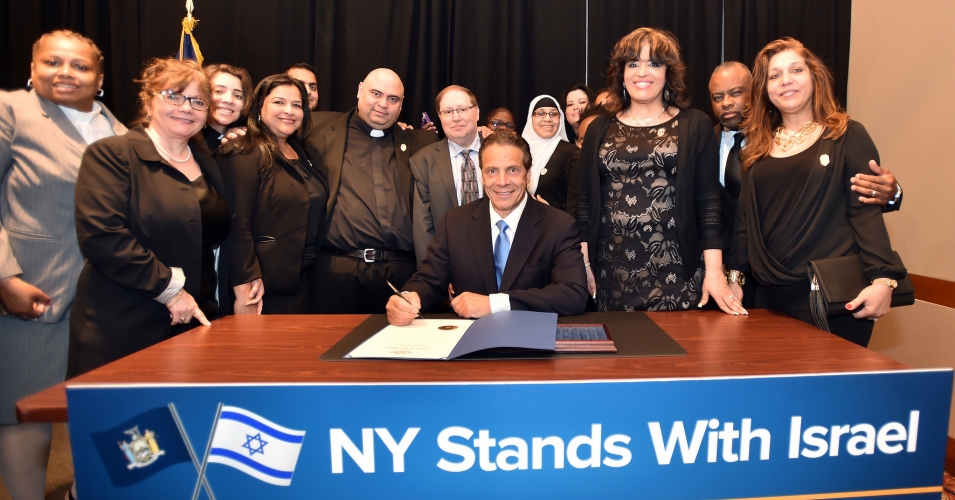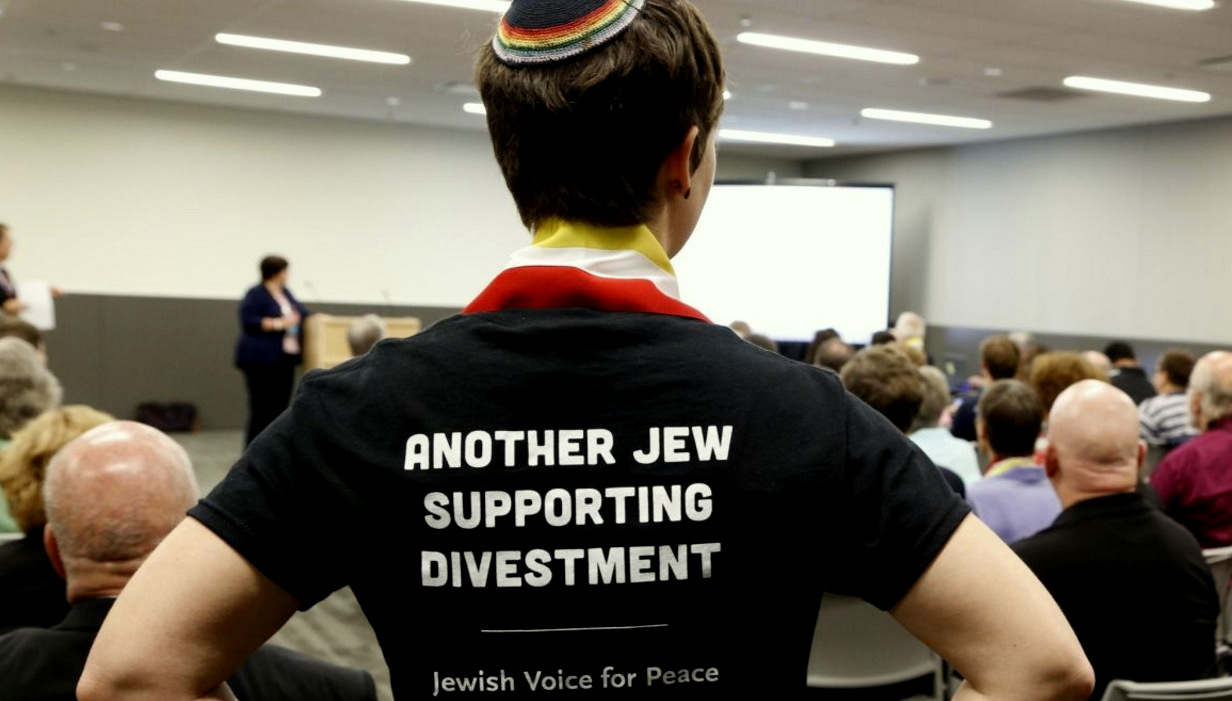Washington, DC – Israel supporters in the US are gearing up for AIPAC’s much-vaunted annual policy conference, with measures to counter the widening campaign to boycott Israel and its West Bank settlements expected to feature prominently in the powerful lobbying group’s agenda.
This includes legislation that several Republican and Democratic Congress members have sponsored to curb the Boycott, Divestment and Sanctions (BDS) movement, which aims to pressure Israel into ending its occupation of Arab and Palestinian land.
AIPAC set the stage for its conference, which runs from Sunday through Tuesday and features leaders of both parties, by sending out an “action alert” to rally support for two anti-boycott bills in the House and Senate.
“Israel has long been targeted by the pernicious Boycott, Divestment, and Sanctions (BDS) movement. Together we must continue the fight to protect Israel from economic warfare and American companies legally doing business with the Jewish state,” the alert said.
“The United Nations and other international governmental organizations have long singled out Israel with unfair criticism and have led efforts to isolate the Jewish state politically and economically.”
An AIPAC official told the Jewish Telegraph Agency that conference talking points would include its backing of two bills targeting BDS, with a focus on a UN database of companies that deal with Israeli settlements.
The bills were initially backed by both parties but its sponsors have found themselves in hot water following criticism by civil liberty groups, leading some Democrats to withhold support.
Related
- Israel to Deny State Benefits to Citizens and Companies That Support BDS
- BDS and Israel’s Declining Support Among Diaspora Jews
- Anti-BDS Laws and Pro-Israeli Parliament: Zionism Is Winning in Italy
- The Lorde Saga – The Consequences of Boycotting Israel
Free-speech advocates and various activist groups have been fighting these bills in court and through grassroots organizing, arguing that boycott is a protected means of political expression under the First Amendment.
“Politicians are increasingly out of touch with the grassroots in this country, on many issues, including Palestinian rights,” said Rahul Saksena, a lawyer at Palestine Legal, a group that supports pro-Palestine civil rights activists.
“While more and more people support boycotts for Palestinian rights, legislators continue to enact unconstitutional anti-boycott laws.”
BDS opponents have recently been dealt a series of setbacks, most notably the declaration by the UN High Commissioner for Human Rights last month that it had identified more than 200 businesses, 22 of them American, that could be held accountable for operating in settlements.
The UN did not release that database of firms, and it is unclear if it ever will, experts say, but that has not slowed momentum to pass legislation that civil liberty advocates believe stifles freedom of expression by erasing the distinction between Israel and its settlements.
“We have seen a wave of legislation in US states and efforts at the federal level … to define any differentiation between the two as boycotting Israel and to seek ways to use US law to either sanction people doing that to punish them or to prevent them from doing it,” said Lara Friedman, president of the Washington, DC-based Foundation for Middle East Peace.
Israel Anti-Boycott Act

Governor Andrew M. Cuomo signs a first-in-the-nation Executive Order directing the divestment of public funds supporting the Boycott, Divestment and Sanctions (BDS) campaign against Israel during a breakfast meeting at the Harvard Club. Afterwards, (Photo: Kevin P. Coughlin/Office of Governor Andrew M. Cuomo)
The non-profit found that as of March 1, 23 states enacted laws or executive orders to withhold contracts from companies and individuals that boycott either Israel or its settlements, essentially conflating the two.
At the federal level, Congress is pushing forward with a bill called the Israel Anti-Boycott Act, which would impose criminal penalties – up to $1m fine and 20 years in prison – on those supporting, promoting or providing information that champions efforts to boycott Israel, including its settlements.
The bill’s main sponsors, who will be speaking at the AIPAC conference, argue that they are merely updating long-standing, anti-boycott legislation, which dates back to the 1970s and were written to address the Arab League boycott of Israel. They deny that the bill would target US individuals or involve criminal or civil penalties.
Critics, such as Friedman, argue that under the bill’s provisions, researchers or activists could be found legally liable for producing information on Israeli settlements based on the UN database or the EU’s differentiation strategy, which requires excluding settlement activities from its bilateral relations with Israel.
This week, AIPAC will also be lobbying for the Combating BDS Act, a bill designed to give a federal green light to the 23 states with laws to combat BDS efforts. Friedman calls these state bills “gag laws” and free-speech advocates like the American Civil Liberties Union (ACLU) have challenged the constitutionality of some of these bills, leading to a major victory for the BDS movement in Kansas.
In January, a federal judge issued a temporary injunction on a Kansas law requiring US individuals and companies to sign a declaration that they will not engage in a boycott of Israel if they want to be awarded a state contract.
But other states seem undeterred by the Kansas ruling, forging through local legislatures to introduce similar bills, or expanding existing laws on the issue.
“We’ve seen laws like this introduced across the country,” said Imraan Siddiqi, executive director of the Arizona chapter of the Council on American-Islamic Relations (CAIR).
“Some cities are implementing these laws in their contracts as well, which is extremely troubling.
“This happened with a mosque that was renting out the Phoenix Convention Center last year for Eid prayers. The language was eventually removed from the contract after the mosque complained.”
Lawsuit filed

A member of Jewish Voice for Peace wears “another Jew supporting divestment” shirt. (Photo: Jewish Voice for Peace)
On Friday, CAIR and representatives of the Muslim Students Association at Arizona State University filed a lawsuit challenging the Arizona statute requiring contractors to certify that they are not engaging in BDS activity.
The university has accordingly been prohibiting groups from inviting speakers to campus who support or are affiliated with the boycott movement.
This included Hatem Bazian, a professor of Islamic law and co-founder of Zaytuna, the first-accredited Muslim college in the US.
Bazian and the AMP plaintiffs argue that the law is a violation of the First Amendment’s guarantee of free speech.
“What they are doing essentially is policing thought,” CAIR’s Siddiqi said.
“They are making it illegal to espouse pro-Palestine advocacy.”
On February 8, several organizations supporting Israel filed an amicus brief – documents presented usually by a group or party that back or oppose a certain outcome in a case – in federal court to uphold the Arizona anti-boycott law, calling Israel boycott efforts discriminatory.
But civil liberty groups like Palestine Legal argue that these laws are tools to crush a human rights movement and shield Israel from criticism for its violations in the Palestinian territories.
“AIPAC and other Israel advocacy organizations are resorting to efforts aimed at shutting down the conversation by punishing those who speak out in support of Palestinian freedom, censoring our speech, and infringing on our constitutional right to boycott,” said Saksena of Palestine Legal.
“These anti-democratic tactics should have no place in a democracy.”
Top Photo | Protesters demonstrate against a state-sanctioned backlash against the movement for Palestinian human rights. New York City, June 9, 2016. (Photo: Erik McGregor/Pacific Press/ Sipa/AP)
The post New Anti-BDS Legislation Expected to Dominate AIPAC Conference appeared first on MintPress News.
